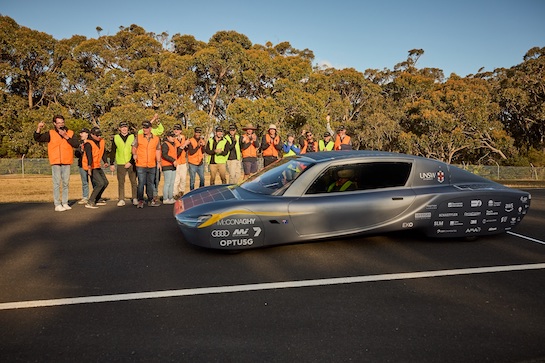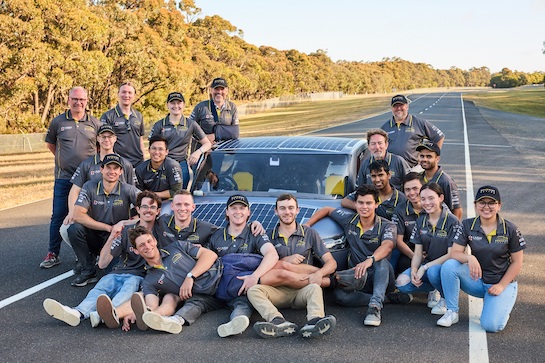Australian-made, solar-powered electric car breaks 1000km record at average of 85km/h
- PostedPublished 4 January 2023
Students at UNSW Sydney have claimed a provisional Guinness World Record by designing and building a solar-powered electric car that travelled 1000km on a single charge in under 12 hours.
Students at UNSW Sydney have claimed a provisional Guinness World Record by designing and building a solar-powered electric car that travelled 1000km on a single charge in under 12 hours.

The Sunswift 7 posted a time of 11 hours 53.32 minutes for the distance, completed over 240 laps of the Australian Automotive Research Centre (AARC) in Victoria, achieving an average speed of nearly 85km/h.
Official “Fastest EV over 1000km on a single charge” honours – and Guinness World Record certificate – will be conferred once timing information and car telemetry data have been analysed and confirmed by a team of experts.
Sunswift team manager and mechanical engineering student Andrea Holden described the feat as “very weird to think that we’ve helped to make something that’s the best in the entire world” and “validation of all the effort everyone in the team has put in”.

“Two years ago, when we started to build this car, everything was going into lockdown and there were a lot of difficult moments but it’s been so rewarding to see the whole team come together and make so much progress and get us to this amazing point. It was a lot of work and a lot of hours and a lot of stress, but it’s all been worth it,” she said.
Sunswift 7 weighs just 500kg, has an aerodynamic design, high-efficiency motors and low rolling resistance tyres.
During the record attempt, a battery management issue caused the car to come to a complete halt at one point, almost ending the team’s hopes of success because vehicles participating can be stationary for a maximum of 15 minutes at a time.

In the end, it took the Sunswift team a nail-biting 14 minutes and 52 seconds to fix the problem and get back onto the track.
The successful Sunswift 7 project was supervised by former Red Bull Racing head of operations Richard Hopkins, who won four F1 world titles during his time with the team and is just as proud of the Guinness World Record.
“To come here and do what we set out to do is just the most incredible feeling. I’m sure those sentiments are shared amongst the whole team,” he said.

Apart from the battery management drama, the Sunswift 7 car stopped only to allow for a change of driver every few hours plus one puncture that necessitated a tyre change.
Professor Hopkins paid tribute to the student team he oversaw.
“Let’s remember, these are not the best-paid professional car-makers in Stuttgart working for Mercedes. This is a bunch of very smart amateurs who have taken all the ingredients and put it together in a brilliant way,” he said.

“Sunswift 7 isn’t a production car of the future, since we’ve compromised on comfort and the cost is prohibitive. But we have shown that if you want to make cars more efficient, more sustainable, more environmentally friendly, then it is possible.
“I used to work in Formula One and nobody thinks we’ll be driving F1 cars on the road in five or ten years. But the technology they use in F1 really pushes the boundaries and some of that filters down and that’s what we are trying to do with Sunswift and what this world record shows is achievable.”
- CategoriesIn Latest News
- Tagselectric vehicles, EV, solar


